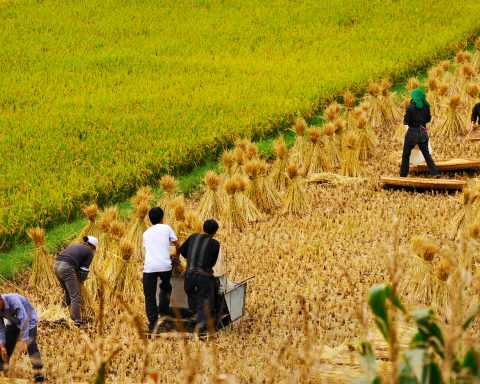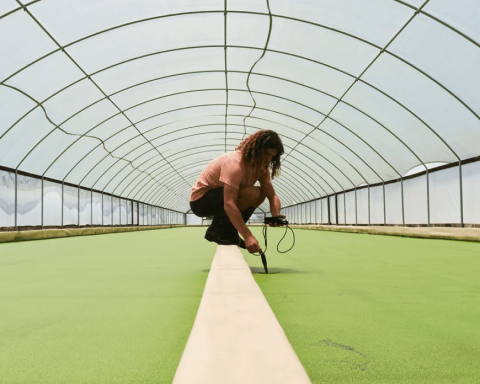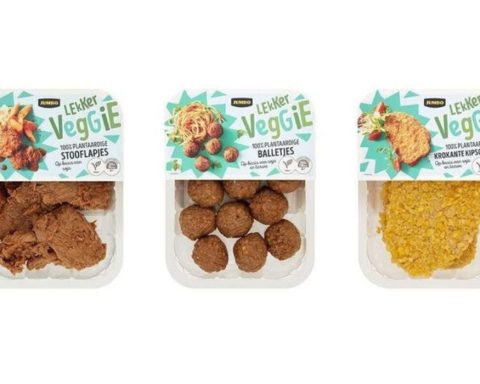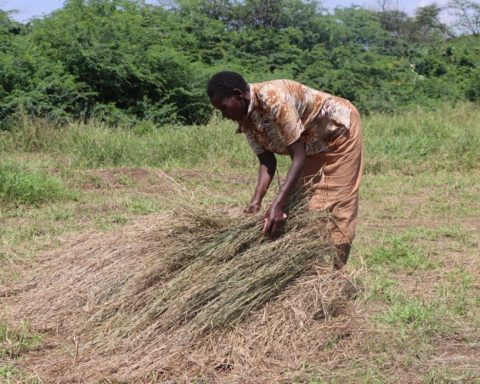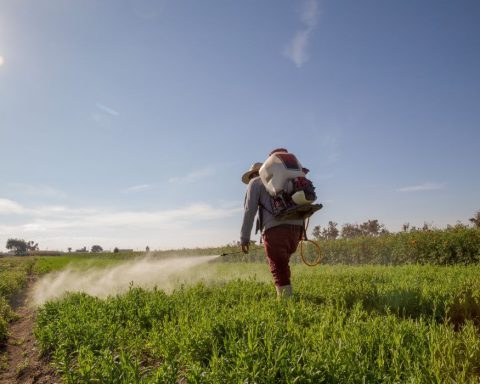In his mid-20s, Jimmy Videle embarked on a road trip across the southern United States in his 1973 Volkswagen bus. Looking for a place to camp at the southern tip of Texas’s Gulf Coast, he came upon a dirt road lined with concentrated cattle-feeding operations. Thousands of cows were up to their knees and elbows in their own feces, and up the road a slurry of manure and rain was streaming into the Gulf of Mexico.
Soon after, he bought his first farm, in northern Arizona, and started growing his own food.
Like most land in the American West, this 37-acre property had been extensively over-grazed by cattle. It was the late 1990s, and Videle relied on agricultural industry magazines and farming norms of the day to fertilize his farmland. He used liquid Miracle-Gro and dried manure paddies to get some summer squash going and built his first chicken coop.
By 2005, he had adopted certified organic protocols, which lean heavily on the use of manure as fertilizer instead of synthetic nitrogen, but a question lingered in his mind: was it possible to grow fruits, vegetables and herbs productively without animal inputs like manure?
The true regenerative agriculture
We’ve turned our planet into an animal farm. Globally, 3.8 billion hectares – more than a third of all habitable land – is used for farming animals. The latest 2021 research in Nature Food estimates that animal agriculture is responsible for more than 19% of direct greenhouse gas emissions. If we include the lost-land opportunity to draw down carbon dioxide from the atmosphere into rewilded pastureland, that estimate jumps to 28% according to the largest meta-analysis on food and the environment, published in Science in 2018. And this doesn’t factor in wider environmental implications like the billions of tons of manure produced each year.
In just five days, America’s 10 billion farm animals produce enough manure to cover the entire U.S., exceeding what farmland can safely absorb. A noxious mix of natural and synthetic fertilizers washing off farmers’ fields and down the Mississippi River has resulted in dead zones in the Gulf of Mexico that stretch more than 20,000 square kilometres.
Given this dire situation, how do we change farming? Agriculture norms are protected over generations by a cultural shield, seemingly untouchable politically. Organic agriculture has become synonymous with spreading manure. But we can learn from those who have changed their minds despite the pressure to conform to common practices.
Transformational changes in farming don’t come easy. They certainly didn’t at first for Videle. But after several years of working on tropical farms throughout Hawaii and Latin America, Videle discovered the ease in exclusively plant-based composting and farming. Just like in a healthy native forest where the only manure deposited is by wild animals that pass through, he learned that the vast majority of organic matter should come from the plants in agricultural systems.
In 2014, after settling down in Boileau, Quebec, Videle and his wife, Mélanie Bernier, established La Ferme de l’Aube, a vegan organic farm on a six-acre parcel of land featuring mixed forest and open spaces for cultivation. They now cultivate more than 400 varieties of fruits, vegetables, herbs, flowers, shrubs and trees, yielding 5,000 pounds of food from less than half an acre, leaving the rest of the acreage for nature.
“Nobody wants to believe that it works, but by taking out manure and putting in plants, you’re gaining nutrients,” Videle says.
The rise of veganic farming
While the term is new, veganic – or vegan organic – agriculture practices date back millennia and have their roots in Indigenous methods. The “three sisters” method of growing squash, beans and corn together was practised by the Iroquois, Cherokee and other Indigenous Peoples throughout Turtle Island (North America) and Mesoamerica and often involved a minimal amount of animal inputs. Veganic methods naturally fertilize the soil by using soil-feeding crops, cover crops and compost without animal products or byproducts. One can also find similar ecological motivations in “stock-free” (livestock-free) organic and conservation agriculture movements.
While there are tremendous benefits in simply shifting away from farming animals to growing plants for human consumption – and efforts are underway to support this “transfarmation” – a shift to veganic farming is seen as the pinnacle of regenerative agriculture by proponents.
A seven-year research study we did at La Ferme de l’Aube showed an increase of soil organic matter of 38.46% while increasing yields and biodiversity on and near the farm.
Dominating discussions around regenerative agriculture, including Big Ag–funded projects, has been the grazing component – using “regenerative grazing” to rotationally graze cattle on pastures, allowing fallow areas to recover to help rebuild soil health. Yet replacing intensive feedlot beef production in the U.S. entirely with grass-fed cattle isn’t feasible, and U.S. pastures could support only about 27% of the nation’s beef production. Regenerative ranching would use two and a half times more land than the niche movement of grass-fed beef.
A more sustainable approach would involve moving away from manure and scaling up veganic compost, which could include municipal and commercial fruit and vegetable scraps, yard and field waste, or chipped wood.
Synthetic fertilizers or manure: The false dichotomy
Organic farming, dominated by manure application rather than synthetic fertilizers, faces challenges with lower crop yields, leading to the need for more land and resources to match conventional farming’s output, according to a 2011 meta-analysis. This synthetic fertilizer or manure comparison is agnostic to the animal-versus-plant-based debate, which largely ignores that it’s more important to look first at what we eat versus how it’s grown. One can also argue that yields should be measured over longer periods of time, taking into account land degradation.
The Green Revolution that started in the 1960s brought in waves of synthetic fertilizers and pesticides and higher yields across the world, lifting billions out of food insecurity. Some describe this as a positive step, while others have documented negative tradeoffs, including mass runoff creating land and ocean dead zones affecting all forms of life, along with other adverse effects on the environment and public health.
What would have happened if, instead of growing more than a third of all crops to feed farmed animals, we had built an agricultural system focused on feeding diverse and healthy plant foods directly to humans? We could potentially feed 3.5 billion more people, according to one 2013 study published in Environmental Research Letters.
Preliminary research from Videle’s farm has found that veganic can be 2.3% more productive than conventional synthetic-fertilizer-based farms and 41% more productive than organic-manure agriculture. Sweet potatoes and tomatoes grown in rich humus soil had yields 21% to 45% higher than those grown with inorganic fertilizer.
Beyond Videle’s small farm, there is a growing network of veganic food producers.
Nobody wants to believe that it works, but by taking out manure and putting in plants, you’re gaining nutrients.
Jimmy Videle, veganic farmer
Iain Cleator, a recently retired University of British Columbia medical school professor, now has a 2,650-acre farm in Wynyard, Saskatchewan, emphasizing ancient grains such as Red Fife and spelt, crop rotation and biodiversity to enrich soil naturally without synthetic fertilizers or manure.
On several stock-free organic farms in Eastern Europe, Strassner Family Farms grows cereals, corn, soya, pumpkin seeds and beans and has become a critical supplier in the area.
If this style of farming is easier, helps the ecosystem thrive, yields an immense amount of food per acre, and provides a great farming lifestyle, why aren’t more doing it this way? “There’s an awareness issue, there’s pervasive beliefs and ideals, but the bottom line is there’s the undeniable pressure from animal agriculture that makes agricultural universities, schools and organic programs promote that manure and animal products need to be used,” Videle says.
While the transition would be complex, veganic agriculture is the pillar of regenerative agriculture since it can increase soil organic matter, increase production per hectare over any animal-based system, and free up land to address the extinction crisis.
Videle now spends a significant amount of time helping other farmers throughout North America become certified veganic (there are currently a dozen certified veganic farms in North America). In 2023, he published a veganic farming handbook with practical and accessible steps to farm this way.
Careful consideration of potential reduced food yields needs to be taken with any sweeping change to global farming practices, as was evident in the decision to abruptly ban agrochemicals in Sri Lanka, resulting in food insecurity and increased reliance on expensive food imports. What is clear is that the organic versus conventional debate misses the mark. Instead we should be focusing on what we produce – more plants for human consumption – and shifting to more stock-free veganic methods if we want a win-win for the planet.
Our society as we know it faces an existential crisis. By incentivizing transformative changes, such as those undertaken by Videle, we can foster a profound regeneration of nature, benefiting wildlife and enhancing our collective well-being.
Nicholas Carter is an independent ecologist with Plant Based Data and is the director of environmental science at the Game Changers Institute.
Check back here as we roll out our Plant Power package this week, along with the release of the 2024 Spring issue of Corporate Knights.



